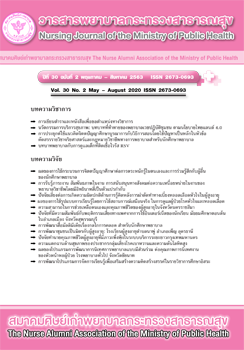Predictive Factors for the Quality of Life of Dependent Older Adults under the Long Term Care system in Bangkok
Main Article Content
Abstract
This descriptive research aimed to examine the quality of life and its predictive factors among dependent older adults. The participants were 133 dependent older adults aged 60 years and older who registered under the long term care program. The participants were randomly recruited from the selected 6 public health centers in Bangkok using the multi-stage sampling technique. Each subject was interviewed by the researcher using a structured questionnaire. Most subjects were female (59.4%), homebound (85.0%), and having a moderate quality of life (67.0%). According to the multivariate regression analysis, it was indicated that social support, functional status, income adequacy, service satisfaction, and home visit by caregivers can jointly predict about 38.6 % of variance in quality of life among dependent older adults (p<.05). These findings can be applied by a community nurse practitioner to improve service quality for dependent older adults living in the Bangkok metropolitan area by focusing on social support, including financial and material support, to increase functional status and to support caregivers during their care giving at home. In addition, preventive long term care focusing on chronic disease management should be developed for older adults to prevent disability and to promote their quality of life.
Article Details
บทความและรายงานวิจัยในวารสารพยาบาลกระทรวงสาธารณสุข เป็นความคิดเห็นของ ผู้เขียน มิใช่ของคณะผู้จัดทำ และมิใช่ความรับผิดชอบของสมาคมศิษย์เก่าพยาบาลกระทรวงสาธารณสุข ซึ่งสามารถนำไปอ้างอิงได้
References
2. Institute for Population and Social Research, Mahidol University and Foundation of Thai Gerontology Research and Development institute. Situation of the Thai elderly. Bangkok: the Institute; 2013. (in Thai).
3. National Health Security Office. a guide to support the management of long-term care services for dependent elderly in the national health insurance system. Bangkok: the Office; 2016.(in Thai).
4. Department of Older Persons. Statistics of elderly in Thailand. [internet]. 2016 [cited 2019 Jan 5]. Available from: http://www.dop.go.th/th/know/1/51(in Thai).
5. Office of Public Health System Development, Health Department. Annual Report 2015. Bangkok: the Office; 2016. (in Thai).
6. World Health Organization. WHOQOL study protocol.Geneva: WHO; 1993.
7. Wannachart M. Quality of life among elderly people with chronic diseases in Ubonratchathani province [Master thesis]. Bangkok: Mahidol University; 2015. (in Thai).
8. Sangkharoek N. The quality of life of elderly adults in Sri-caiangmai district, Nong Khai province [Master thesis]. Bangkok: Mahidol University; 2011. (in Thai).
9. Chanchang P. Development and enhancement of the quality of life of elderly people in Bangkok. Journal of Pathumthani University 2011;3(3):66-78. (in Thai).
10. Sukanun T, Jariyasilp S, Thummanon T, Jitpakdee P. Quality of life of the elderly in Bansuan municipality, Chonburi province, Thailand. Journal of Public Health 2011;41(3):240-9.(in Thai).
11. Khamwong W, Noosawat J, Prathanworapanya W, Siripanya J. Factors relating to quality of life of elderly. Journal of Health Science Research 2011;5(2):32-40. (in Thai).
12. Bualueang A. Factors related to quality of life among older adults recovering from a stroke [Master thesis]. Bangkok: Mahidol University; 2010. (in Thai).
13. Uddin MA, Soivong P, Lasuka D, Juntasopeepun P. Factors related to quality of life among older adults in Bangladesh: a cross sectional survey. Nursing and Health Sciences 2017;19:518-24.
14. Chen HM, Chen CM. Factors associated with quality of life among older adults with chronic disease in Taiwan. International Journal of Gerontology 2017;11:12-15.
15. Kumar SG, Majumdar A, Pavithra G. Quality of Life (QOL) and its associated factors using WHO QOL-BREF among elderly in Urban Puducherry, India. Journal of Clinical and Diagnostic Research 2014;8(1):54-57.
16. Savirasarid N. The selected factors related to quality of life of elderly people in Bangkok [Master thesis]. Bangkok: Mahidol University; 2008. (in Thai).
17. Zubritsky C, Abbott KM, Hirschman KB, Bowles KH, Foust JB, Naylor MD. Health-related quality of life: expanding a conceptual framework to include older adults who receive long-term services and supports. Gerontologist 2013;53(2):205-10.
18. Public Health Nursing Division. Information of dependent older adults in Bangkok. [internet]. 2018 [cited 2019 Feb 20]. Available from: http://phn.bangkok.go.th/index.php (in Thai).
19. Daniel WW. Biostatistics: a foundation for analysis in the health sciences. 6th edition. New York: John Wiley & Sons, Inc;1995.
20. Jitpraphai C, Wongphaet P. Integrative rehabilitation medicine Ramathibodi. Bangkok: RuenKaew Printing. 1999. (in Thai).
21. Goswami AK, Kalaivani M, Gupta SK, Nongkynrih B, Pandav CS. Usefulness of mid-upper arm circumference in assessment of nutritional status of elderly persons in Urban India. International Journal of Medicine and Public Health 2018;8(1):34-37.
22. Chadit W. Clients’ satisfaction towards outpatient pharmacy service quality at Chaophraya Yommarat hospital, Suphanburi province[Master thesis]. Bangkok: Silpakorn University; 2016. (in Thai).
23. Itprasert S. Quality of life of the elderly in Klaeng Kachet municipality, Mueang district, Rayong province [Master thesis]. Chonburi: Burapha University; 2017. (in Thai).
24. Suksabuy P. Evaluation of long term care for dependent elders by family care teams in Chai Buri district, Surat Thani province. Region 11 Medical Journal 2017;31(2):257-69(in Thai).

